2022: good reads for a mixed bag of a year
It has been an odd year, a time of puzzling messages and strange signals. The key event was the election that saw the Morrison government bundled out of office although the picture was clouded by the emergence of a clutch of independents under the Teal banner and some victories by the Greens. Even though Anthony Albanese took the big chair the Labor party attracted the votes of fewer than one in three Australians, an all-time low.
One view is that the 2022 election represents a fundamental change in the country’s political structure, with the breaking of the two-party paradigm and the rise of local populists through the adroit use of social media. Tim Dunlop’s Voices of Us (published by UNSW Press, $30) is a good representation of this, and he does a solid job of drilling down into the local campaigns of the Teals. But he acknowledges that the new model, such as it is, is a work in progress, and a proper assessment will take several years. Another election will be needed to see if the 2022 outcome was a cultural shift or a short-term response to an unpopular PM and a series of policy bungles.
If one is looking for stability amongst confusion then a book to turn to is John Howard’s A Sense of Balance (HarperCollins, $40). He sees the historic strength of Australian society as stemming from a willingness to compromise and a wariness of fads and radicalism. Effective governments reflect this, he says, and he worries that both sides have moved away from genuine community connection. In particular, he cites the corrosive factionalism that has infected the Liberal party as a critical obstacle to needed reforms. In the second half of the book Howard discusses various topics that interest him, such as constitutional change and the long-term ramifications of 9/11. One can’t help feeling that Howard’s basic common sense and optimism is now in short supply. Après Howard, le déluge.
Howard devotes a chapter to relations between Australia and China, a theme which is explored in greater depth in Australia’s China Odyssey (UNSW Press, $35), by academic James Curran. It has always been a problematic relationship although successive Australian governments have done a fair job of responding to China’s political lurches. The past decade has seen China emerge as a regional bully, prone to making belligerent but strangely cack-handed pronouncements and demands. The result is that China has created the situation it sought to avoid: everyone lining up against it. Curran believes that the Albanese government will probably retain the policy settings of its predecessor but with less strident language. We will have to wait and see.
Kevin Rudd has always seen himself as something of an expert on China. In The Avoidable War (Hachette, $35) he examines the potential for open military conflict between China and the United States, with Taiwan as the most likely flashpoint. Thankfully, Rudd puts aside his tendency for self-aggrandisement and he has useful things to say about the way the leadership clique in Beijing sees the world. Rudd suggests there can still be areas where understanding can be reached between the US and China, similar to the arrangements established between the US and the Soviets that prevented the Cold War from turning hot.
Written from the US perspective, The Danger Zone (Norton, $50) argues that if a shooting match between China and America is going to happen it will be within the next few years. The authors, China-watchers Michael Beckley and Hal Brands, believe that China is reaching the end of its stretch of economic growth and will soon begin to slide downhill. Without constant injections of funds the country’s military forces will begin to decay. The essential dilemma, from Beijing’s perspective, will become: use it or lose it. It is a scary hypothesis but Beckley and Brands propose ways to discourage dangerous adventurism from China, including more open support for Taiwan. If the superpower rivalry then turns into a marathon the basic economic strength of the US is likely to prevail.
Stories about security agencies usually make interesting books, and The Secret History of the Five Eyes (Allen & Unwin, $35) is more interesting than most. Five Eyes is an intelligence-gathering and -sharing network comprising the US, the UK, Canada, Australia and New Zealand. It has been around since the Cold War era but its existence was not officially acknowledged until 2010. Richard Kerbaj, a British journalist, has drawn together a huge amount of research material, which he supplements with interviews from political leaders and officials, including Asio chief Mike Burgess. The Five Eyes has had numerous successes but also some spectacular failures. Kerbaj recounts plenty of spy-game stories, and he concludes that the alliance, while far from perfect, plays an important role in the global security picture.
Australia’s involvement in military conflicts is the subject of The War Game (Allen & Unwin, $45) by historian David Horner. He delves into the occasions where Australia has fought in wars at some level, noting that the country has always been the junior partner in a coalition. The leaders who have committed Australian forces have been keenly aware of the need to manage alliances, first with Britain and later with the US. The decision to send troops into harm’s way has never been taken lightly, and Horner tracks the relations between government ministers and the military leadership. After Iraq and Afghanistan there is an awareness that military involvements, even if begun with clear objectives, can become interminable quagmires. Horner concludes the book with a list of ‘rules’ that governments should consider before making life-and-death decisions.
Physicist Mark Oliphant and medical researcher Howard Florey are widely recognised for their scientific achievements but Brett Mason’s Wizards of Oz (UNSW Press, $35) focuses on their activities in World War II. They knew each other from their youthful days in Adelaide and their paths continued to cross even while their research took them in different directions. Florey did not make the initial recognition of penicillin but he was the key figure in turning it into a working antibiotic drug, saving countless lives and limbs. Much of Oliphant’s wartime work related to developing microwave radar but he was also a contributor to the atomic bomb project, especially in the process of separating uranium isotopes. Mason tells the dual story of two men who made a difference with admirable clarity and pace.
The year has seen some excellent novels, with an outstanding one being Jennifer Down’s Bodies of Light (Text Publishing, $33), which won the Miles Franklin Literary Award. It resolutely avoids the fashionable format of a tight focus of time and place; instead, it sprawls across periods, locations and genres, following the story of a woman called Maggie (although at various points she has other names). Abused as a child and traumatised by dysfunctional relationships in her adulthood, she searches for love and stability, although she eventually realises that she cannot run away from her past and must somehow come to terms with it. The novel could have easily turned into a mawkish mess but Downs maintains control of the complex structure. Bodies of Light requires attention and patience, unfolding at its own pace and ending up exactly where it should be.
Another book that jumps between genres is The Seven Moons of Maali Almeida (Sort of Books, $35) by Shehan Karunatilaka, winner of the 2022 Booker Prize. It is a difficult book to classify: metaphysical murder mystery is probably the closest term. In the midst of the Sri Lankan civil war, Maali Almeida is a photographer who wakes up dead, and is told he has seven days to lead people in the real world to a cache of crucial photographs, as well as solve his own murder. Along the way he encounters chatty ghosts, clues hidden in thickets of folk mythology, and an array of confused warriors. The afterlife, it seems, isn’t what it used to be. The book is a romp but Karunatilaka keeps it on track, and there is a deadly serious core.
The International Booker Prize went to Tomb of Sand (Tilted Axis Press, $36), written by Geetanjali Shree and translated by Daisy Rockwell. This is the first time that a novel translated from Hindi has won the award. While the story is told from several perspectives the central character is an 80-year-old woman, initially known only as Ma, who decides to travel across India to Pakistan, with her daughter in tow. The motive for the journey is revealed only at the end. Ma tells pieces of her story during the journey, and shows that she also has an impish sense of humour. There are many threads here but overall the story is uplifting, proving that you are never too old to have an adventure, and to find again what might have been lost.
Across the Pacific, the US continues its slide deeper into polarisation and social psychosis. Ari Fleischer, former press secretary to George W. Bush, ties much of the problem to the mainstream media in Suppression, Deception, Snobbery, and Bias (HarperCollins, $53). He notes that most political journalists are unabashedly left-wing and have been educated – or over-educated – in elite universities. Consequently, they effectively live and work in a super-liberal echo chamber. He provides a mountain of examples of stories being ignored or actively buried because they might be damaging to the Democrats, while anything that might harm the Republicans, no matter how tenuous the basis, is given massive coverage. Journalists are entirely aware that a large majority of the population distrust and dislike the media but they are not willing to make any changes. Fleischer puts this down to the belief of journalists that they are several cuts above ordinary people. In a word, they are snobs.
Nicholas Kardaras, a specialist in treating addiction, takes a different approach. In Digital Madness (St Martin’s Press, $42) he identifies the root cause of polarisation as an excess of digital technology. Many intensive users have fallen into a pattern of binary thinking, able to see only extremes and incapable of empathy. They are perpetually angry, fearful and impulsive – signs of Borderline Personality Disorder, says Kardaras. Digital technology, when misused, can be as addictive and as dangerous as any drug. He proposes a treatment plan but acknowledges that most tech addicts will not even accept that there is a problem. Kardaras’ thesis is not entirely persuasive but the book provides much food for thought.
Writer and commentator Jeff Sparrow says that he has been a socialist for thirty years, and the collection of essays in Provocations (NewSouth Publishing, $27) confirms it. He wears his black arm-band where it can’t be missed, although it is not clear who he is actually trying to provoke. His brand of socialism relates more to culture than economics, and the country he lives in seems to be closer to Guardian-world than Australia. His favourite trick is applying modern-day standards to historical events, and it becomes a bit silly after a while. He does, however, have a sense of humour, which is unusual for left-wing academics.
Sparrow says what you would expect him to say, and what he has been saying for some time. For this reason he is the winner of the 2022 Trees Are Dying For This Award, given annually by this reviewer for the most unnecessary book of the year. The TADFT prize is only a very cheap certificate but it is yours, Dr Sparrow.
Got something to add? Join the discussion and comment below.
Get 10 issues for just $10
Subscribe to The Spectator Australia today for the next 10 magazine issues, plus full online access, for just $10.
Derek Parker is a freelance writer and reviewer.
You might disagree with half of it, but you’ll enjoy reading all of it. Try your first month for free, then just $2 a week for the remainder of your first year.

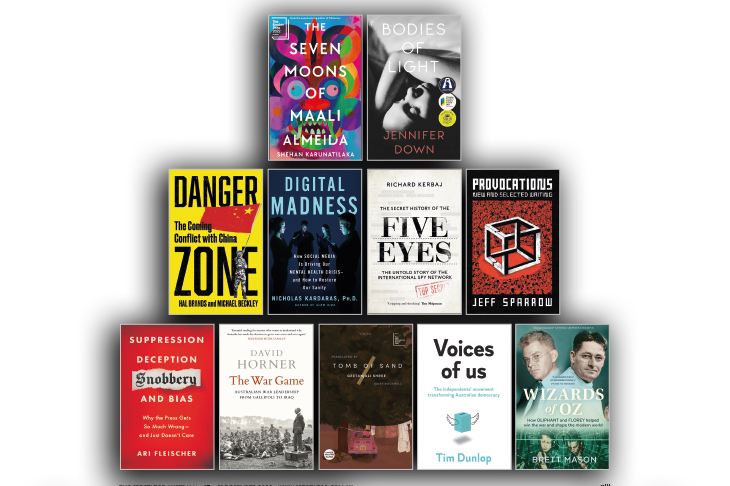
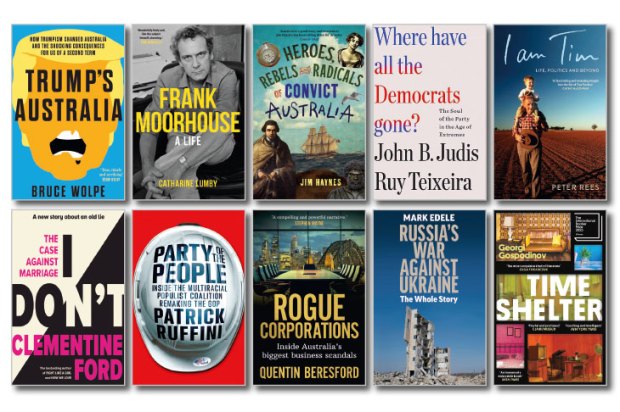
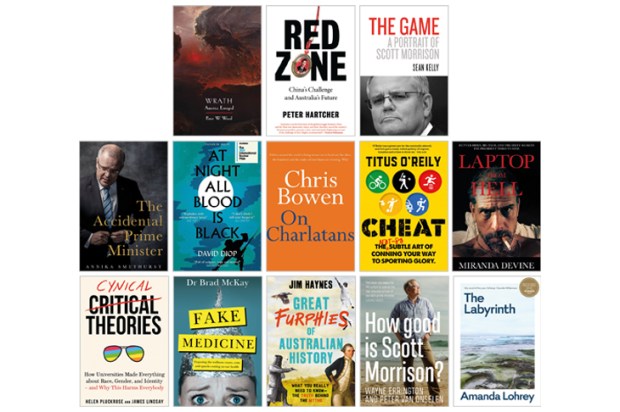
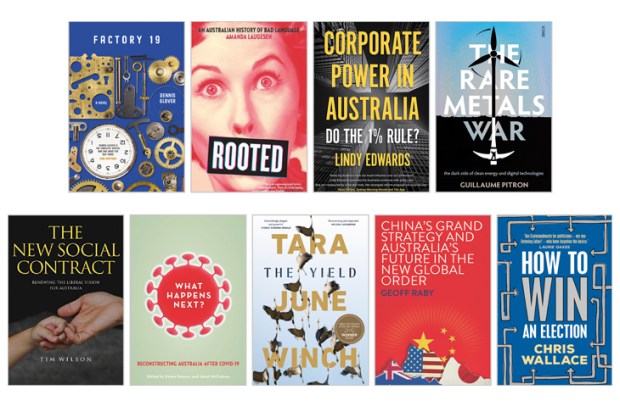

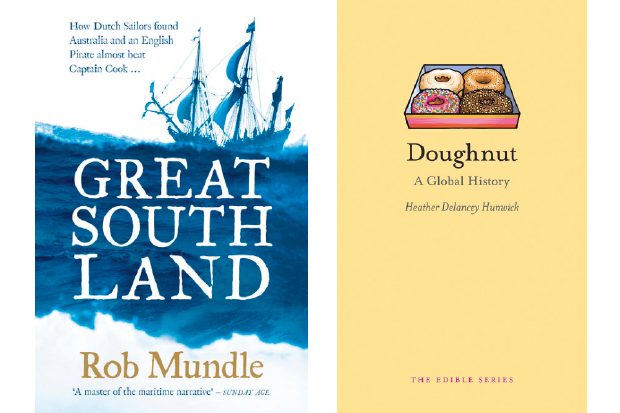







Comments
Don't miss out
Join the conversation with other Spectator Australia readers. Subscribe to leave a comment.
SUBSCRIBEAlready a subscriber? Log in